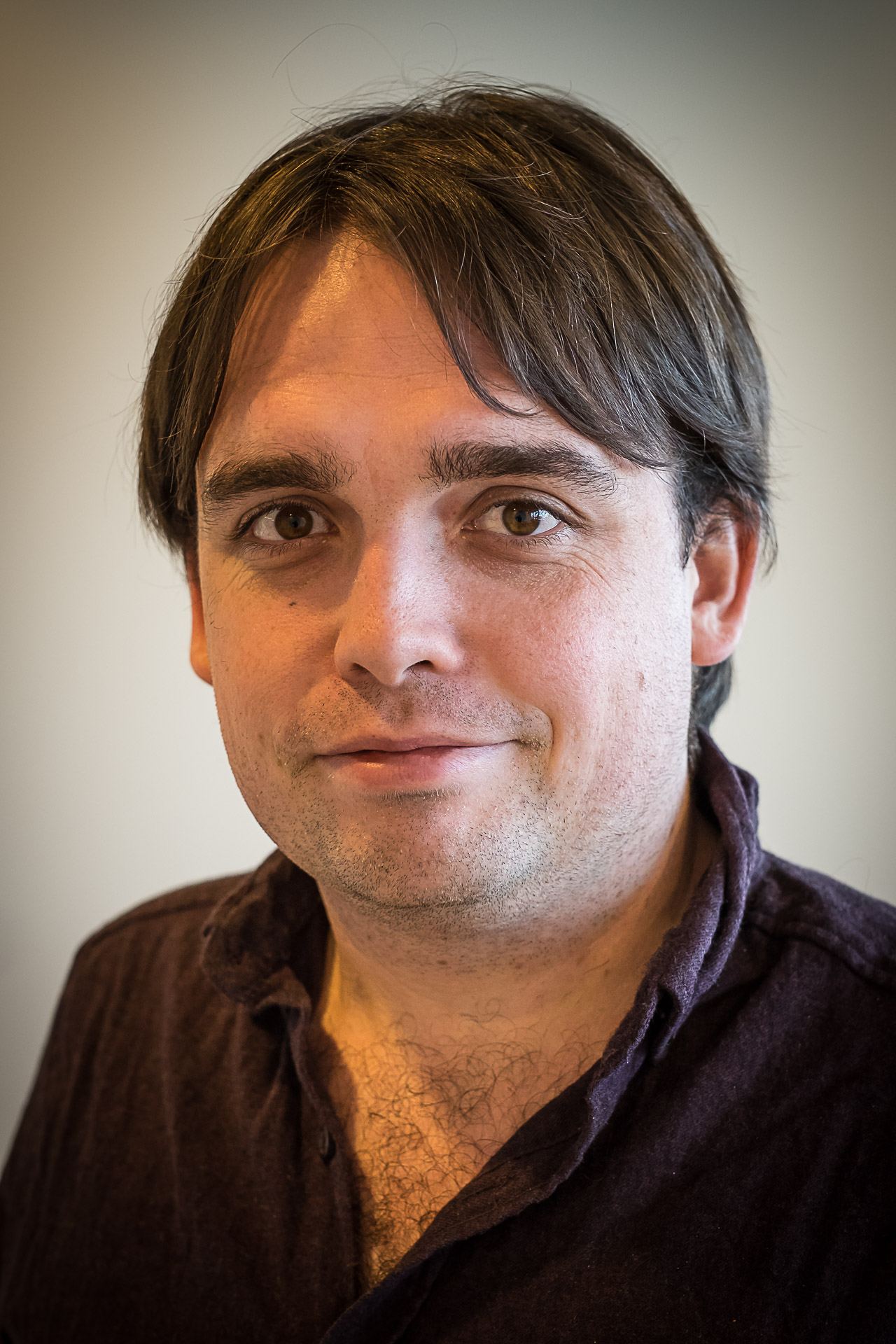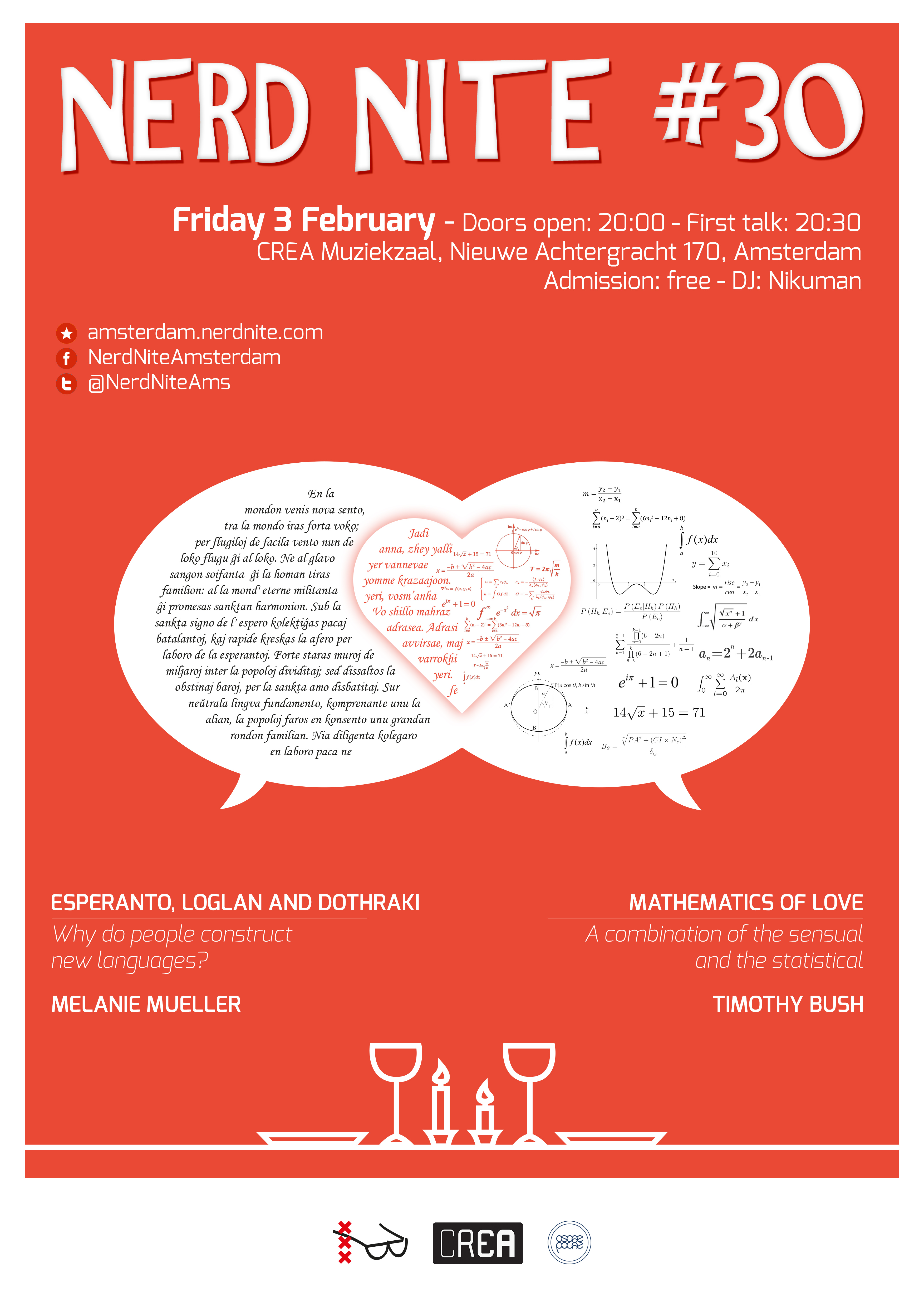Nerd Nite 30
The new year has just begun and what better way to start than sprinkling it with a bit of nerdiness? Join us on 3rd February for an inspiring evening on maths, language and love at Nerd Nite 30! Want to find out if you and your significant other have the right numbers? Our first speaker Tim Bush will reveal how he can predict divorces by simply using the most universal language of all: mathematics! More interested in syntax than algebra? Fear not! Our second speaker Melanie Mueller will talk about Dothraki, Loglan and Esperanto, discuss why people construct artificial languages and delight us with an Esperanto crash course. Finally, if you’re still looking for your soul mate you can sign up for our pre Nerd Nite speed-dating here https://goo.gl/forms/jP8GmftdOcFEEXhk2! Be there and be kvadrato!
DETAILS:
Friday 3 February
Doors open at 20:00
First talk at 20:30
at CREA Muziekzaal
Nieuwe Achtergracht 170
1018 WV Amsterdam
The mathematics of love: a combination of the sensual and the statistical
By Tim Bush
 Want to save yourself from the pain of one-sided love? Tim Bush will save your love life using maths! Unrequited love is not something you wish for your worst enemy, even more so when your loved one is leading you on. He’ll discuss a mathematical model describing a famous instance of unrequited love using data that goes back to 14th century love poems. Afterwards the evening will be brought to a climax by discussing another mathematical model with a shockingly high success rate of 90% at predicting divorces, based simply on a 15 minute video of the couple. Are you ready for a combination of the sensual and the statistical, the arousing and the analytical, the titillating and the trigonometric, the X-rated and the exact? Learn to look at love from a mathematician’s point of view!
Want to save yourself from the pain of one-sided love? Tim Bush will save your love life using maths! Unrequited love is not something you wish for your worst enemy, even more so when your loved one is leading you on. He’ll discuss a mathematical model describing a famous instance of unrequited love using data that goes back to 14th century love poems. Afterwards the evening will be brought to a climax by discussing another mathematical model with a shockingly high success rate of 90% at predicting divorces, based simply on a 15 minute video of the couple. Are you ready for a combination of the sensual and the statistical, the arousing and the analytical, the titillating and the trigonometric, the X-rated and the exact? Learn to look at love from a mathematician’s point of view!
Bio:
Tim Bush became interested in the mathematical modelling of romantic love while studying for his PhD in Physics at the University of Edinburgh. He has also worked on mathematical models of bacteria, honeybees, geology and astrobiology, and now works as a Data Scientist in London. Previously, he worked on mathematical models of lakes at the University of Amsterdam. In his free time he enjoys board games, video games and boxing.
Esperanto, Loglan and Dothraki: Why do people construct new languages?
by Melanie Mueller
 Did you know that there’s a language that can be played on musical instruments? That there are native speakers of Esperanto? That there’s a language with only 120 root-words? That languages were designed to test a scientific hypothesis? In this talk, I’ll give a short tour through the colorful and eccentric world of constructed languages, and the reasons behind them. I’ll end with a mini crash course in Esperanto. Estu tien aŭ kvadrata!
Did you know that there’s a language that can be played on musical instruments? That there are native speakers of Esperanto? That there’s a language with only 120 root-words? That languages were designed to test a scientific hypothesis? In this talk, I’ll give a short tour through the colorful and eccentric world of constructed languages, and the reasons behind them. I’ll end with a mini crash course in Esperanto. Estu tien aŭ kvadrata!
Bio:
Melanie likes to find patterns, and play around with them. This led her to play with Lego, get a PhD in Theoretical Physics, speak Esperanto, and do biology research at Harvard. Currently, she works as a data scientist at Booking.com, where she helps to transform patterns in customer data into fun holidays.
